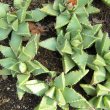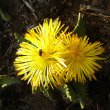| Botanical Name |
|
| Family |
Aizoaceae - The fig-marigold family or ice plant family |
| Pronunciation |
|
| Common Name(s) |
|
| Plant Group |
- Ground Cover A plant with a low-growing, spreading habit, grown specifically to cover the ground.
- Succulent A plant having fleshy stems or leaves often adapted to dry conditions.
|
| Plant Size |
- Small
| Tree | 4m to 8m |
| Shrub | 50cm to 75cm |
| Perennial/ground cover | 10cm to 20cm |
| Bulb | 20cm to 30cm |
| Succulent | 10cm to 20cm |
|
| Position |
- Light or Dappled Shade Found below trees with sparse, open foliage. Ideal for the protection of herbaceous plants.
- Partial Shade The area is in shade for part of the day and in full sun for part of the day.
- Sun The area is in full sun for all or most of the day, all year round.
|
| General Information |
- Drought Tolerance: High The plant is well adapted to arid conditions; it can survive long periods of drought and high temperatures without extra water.
- Evergreen Plants that have leaves all year round.
- Frost: Half-hardy The plant is able to survive low temperatures and some frost but requires protection against severe frost.
- Water Wise Plant species originating from low rainfall regions that require less water to survive and thrive than other plant species.
|
| Specific Information |
Faucaria tigrina is a small plant of 8 cm diameter, with thick triangular leaves. On the edges of the leaves there are upright teeth in opposite pairs that look like an animal's mouth. The plants are light green, turning purplish in strong sunshine. The flowers have a silky sheen and are unexpectedly large, almost covering the whole plant.
Faucaria Tigrina is an endangered species in the wild with the population decreasing as a result of overgrazing and urban expansion around Grahamstown.
|
| Ad Break |
|
| Flowers |
| Description |
|
| Season |
- Summer to Autumn Plants will seldom bloom for the entire season as given in the list, but should flower during a period within these parameters.
|
| Colour |
|
| Growth Rate |
- Moderate to Fast Specifying growth rate can be very misleading as there is considerable variation of growth rate depending on type and species of plant, available water, supplementary feeding, mulching and general care, as well as the plants suitability and adaptability to the garden environment.
|
| Plant Uses |
- Attracts bees, butterflies or other insects This plant attracts insects which can be food for birds or other creatures in your garden.
- Container Trees, shrubs and ornamental species that can adapt to growing in a restricted environment.
- Edging A low growing plant that provides softness or definition to the edges of a bed or walkway.
- Filler Either a fast growing tree or shrub used temporarily to fill in an area while the permanent plants grow to a desired size, or a plant used to fill gaps in borders or beds.
- Pot Plant A plant that needs a protected environment on a patio or indoors.
- Rock Garden An area constructed of larger rocks, arranged naturally, to emphasise the use of stones as a main element. Generally plants used do not need a lot of care.
- Stabilize Banks Plant is used to prevent soil erosion because their roots will form a mat that stabilizes the soil and keeps it from washing away in heavy rains.
- Suitable for smaller gardens Such plants do not have invasive root systems, remain small or controllable and can often be grown in containers.
- Wild Garden An indigenous garden planted for the benefit of wildlife and birds. Provides food, water, a variety of mini-biomes and no poisonous chemicals are used.
|
| Distribution and Habitat |
around Grahamstown in the Eastern Cape, in Albany Thicket and Savanna, on open, rocky patches, in a dark clayish soil with a low pH, in mountain renosterveld.
|
| Planting Suggestions |
Tiger's jaws will grow in almost any soil as well as it is well-drained. They thrive on a little compost, and some fine mulch spread between the plants would also be a good idea. Tiger's jaws tolerates, and in fact grows better, if they have a little shade. Well suited to containers and pots.
|
| Medicinal Uses |
|
| Ad Break |
|










Discuss this plant
Share knowledge, ask a question or give an experience.